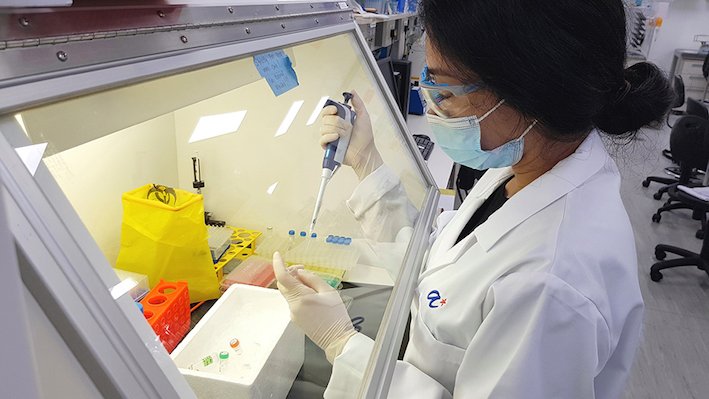
Image credit- a-star
Made-in-Singapore cancer drug, ETC-159, has achieved a new developmental milestone in achieving “First Patient First Visit ” in Phase 1B. The first dose of ETC-159 has been administered to patients in this new phase of clinical testing, which for the first time, will look at efficacy in addition to assessing the safety of ETC-159 in treating different types of cancers.
This clinical study will include subgroups of colorectal, endometrial and ovarian cancer patients from two sites in Singapore (National University Cancer Institute, Singapore and National Cancer Centre Singapore) and up to seven clinical sites in the United States, including four confirmed sites, The University of Texas MD Anderson Cancer Center (Houston, Texas); University of Colorado (Aurora, Colorado); Washington University in St. Louis (Missouri); and Duke University (Durham, North Carolina). The trial is expected to be completed by 2023 at the latest.
ETC-159 was jointly developed by Duke-NUS Medical School (Duke-NUS) and the Agency for Science, Technology and Research (A*STAR), and first entered clinical trials in June 2015 . ETC-159 targets a range of cancers including colorectal, endometrial, ovarian and pancreatic cancers, which contribute to a significant fraction of Singapore’s cancer burden. A subset of these cancers are caused by hyperactivity in a cell signalling pathway known as the Wnt pathway.
ETC-159 is an upstream inhibitor of the Wnt pathway and the clinical trial will determine to what extent this drug can slow or halt the growth of Wnt-high cancers or if ETC-159 can enhance the activity of immunotherapy in those patients that normally do not respond to immunotherapy. It has previously been shown that increased expression of Wnt pathway related genes is associated with drug resistance and exclusion of tumour-killing immune cells in the targeted types of cancers. The clinical trial uses ETC-159 to block the Wnt pathway so that immune cells can infiltrate the tumour. The trial will also combine ETC-159 with the immune checkpoint inhibitor pembrolizumab to stimulate the immune cells to kill tumour cells.
The Experimental Drug Development Centre (EDDC), a national platform for drug discovery and development, brought ETC-159 to the successful completion of Phase 1A clinical trials in July 2018. In that phase, proof of the drug’s mechanism of action was achieved and a safe dose level established in 32 patients with advanced solid tumours.
EDDC, together with POLARIS at A*STAR’s Genome Institute of Singapore (GIS), and the Diagnostics Development (DxD) Hub, have also developed a novel diagnostic test in agreement with the US FDA, to identify a particular subgroup of colorectal cancer patients predicted to respond well to ETC-159 due to the presence of gene fusions involving R-spondin genes (RSPO2 or RSPO3) in their tumours. Such patients comprise only about 8% of colorectal cancers and will be identified upfront, based on left-over tumour tissue to be included in Phase 1B of the study. The test will be performed at POLARIS for all clinical samples from this trial.




